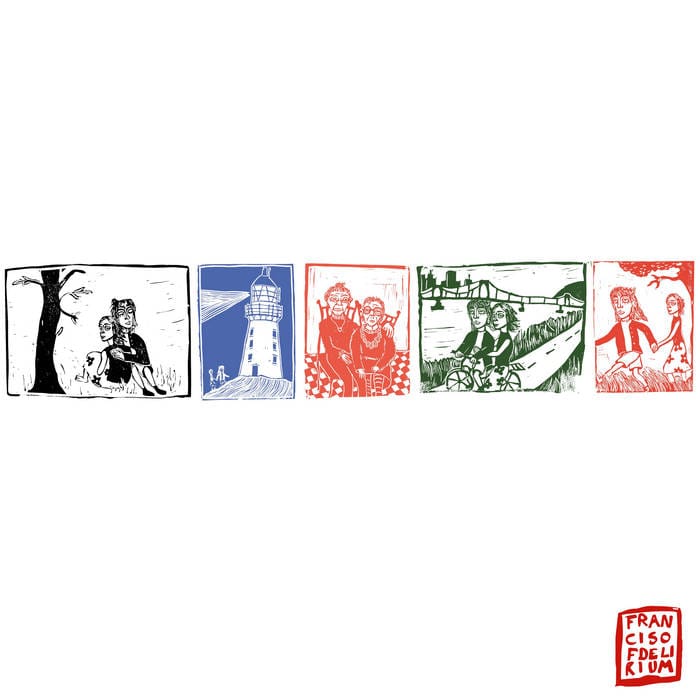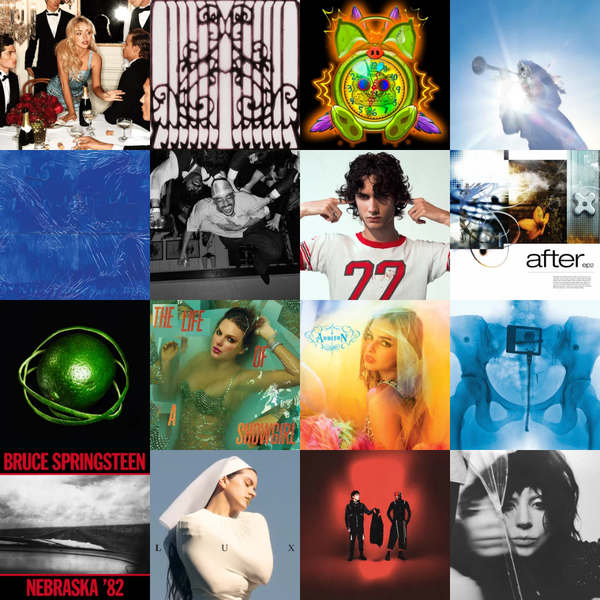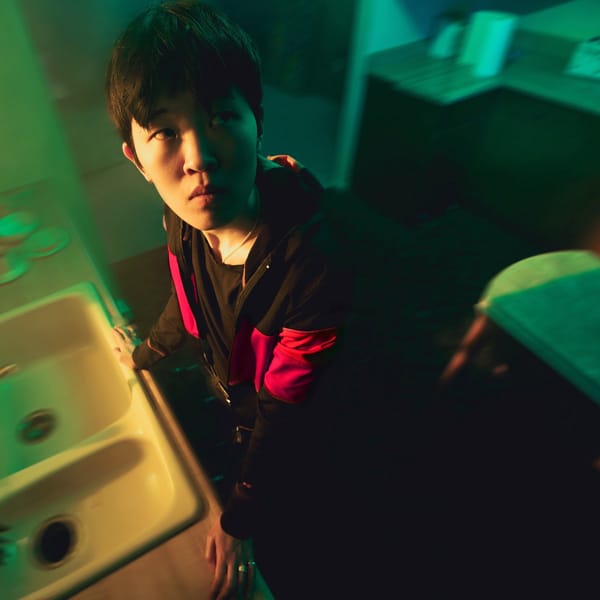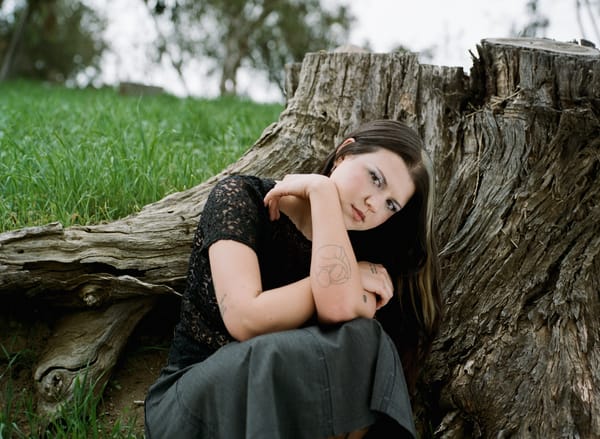Nothing Deep To Say #8: Francis of Delirium (Jana Bahrich) And Producer Chris Hewett Make Shimmering Pop Songs On Debut Album Lighthouse

I was looking for Catherine Marks productions, the same way I did for Mike Spencer and “Off-World”, and “Real Love” swept me off my feet with its anthemic choruses and gorgeous production. What amazed me even more is that the remainder of Lighthouse is just as polished, produced by the musician herself Jana Bahrich with Luxembourg-via-Seattle musician Chris Hewett. Engineer Joylon Thomas (son of late Sigur Ros producer Ken Thomas) applies the same slick atmosphere he’s applied to bands like Daughter – yes, he worked on the album version of “Youth” – to Francis of Delirium’s music, exchanging the darker grunge-inspired material for a glistening concept album about falling in love with your best friend.
This is a level-up – as shiny as any late-90s alt-rockers you can think of. You probably won't find a better sounding record of this kind this year; it's just this and Hana Vu. Up until now, Jana Bahrich and Chris Hewett did most of the work outside of mixing; this time, they had a professional studio in Holtz Sound, and you can hear it in every second of what they made.
On the paid bonus, we talk more about co-writing “Real Love” and expressing queer identity through her music (because talking about it on the free part would miss the point of the newsletter!) Here, we're focused on songwriting process and production, as always!
How did you meet?
Chris Hewett I have two boys, and I wanted to teach them how to play music, so I started a School of Rock-esque music education in Luxembourg called Rockclub. I just wanted to have younger people have the opportunity to play live music around town, because there's not really the space for that.
Jana Bahrich: You have to go through the conservatory just to start anywhere.
Chris Hewett: The conservatory just seemed like to be the only option to to play music around here, or play it at school in the school band. Jana and my son both went to the same school together. And so she came over and we quickly discovered that you really liked the Pearl Jam video for Jeremy. My high school through early college years were in Seattle, with the whole Grunge scene blowing up. So we had this commonality of loving that whole era.
So what made you move from Seattle to Luxembourg? Because that's a huge change.
Chris Hewett: My wife works at Amazon and she always wanted to do a relocation. We were given the opportunity for two years to relocate, so we fell in love with Europe in two years, became three then five, and now it's been 10 years. And we literally don't plan on moving back to the US. We're pretty much all in Europe.
How did you start making music together?
Jana Bahrich: We would just play covers of songs. And then I started writing my own songs, so we were mixing them into the setlist. There was a Battle of the Bands in Luxembourg called “Screaming Fields”, and I had decided that I was going to take a gap year to do this. That sounds kind of ridiculous, but I really enjoyed performing live music through [Rockclub], and we had started writing songs already. Our first EP was written to have something to play at that battle of the bands, and then I asked Chris to be the drummer for the band, which lasted a really long time.
Now it’s a solo project of Jana. Any reasons for this change?
Jana Bahrich: I think it's just easier to name it that way because Chris doesn't play live with us. So it's a solo project, but the process is still pretty collaborative.
How did you both get into production?
Jana Bahrich: We both got into it at the same time, I would say, because you would encourage me to start recording stuff in GarageBand.
Chris Hewett: You were pretty much recording everything on your phone at the time, right? You had millions of ideas in your phone, and I was encouraging you to try to hit “record” as much as possible. That was my whole motivation [behind starting] was just wanting to see these young people and their ideas come to fruition. And so encouraging you (turns to Jana) to do that. And then what's also amazing about you is you get inspired, and then you really run with it, and you actually make it happen.
Jana Bahrich: I was just using GarageBand to get those ideas down and add little production things. And then we would maybe like to work on those songs together. Then we would both go away, and just try stuff out on GarageBand until Chris made me get Logic. And then once we did those songs for the EP, and we thought Hey, I feel like people really responded to this live show, let’s record these songs.
Chris started getting really into the technical side. And we set up the drums downstairs, next to his laundry machine and had some people from studios in Luxembourg come over to help us figure out things like miking setups and stuff like that. So you can definitely hear it in those first two EPs.
Was the drum setup the same from Assault and Battery to the Luxembourg studio Holtz Sound?
Chris Hewett: The first two EPs we did record the drums here in my house in the basement, but then on Funhouse, we still recorded everything pretty much here. But the drums we recorded in a Luxembourg studio where we had really high end microphones and a really nice space. And then for the album, we actually had been re-recording everything in the studios. For the songs with Catherine Marks, we had a specific setup in studio space for the drums in particular for those two songs. But then for the rest of the songs we finished at a different studio in Luxembourg (with Charles Stoltz).
Talk about your songwriting process.
Chris Hewett: After Jana was like “I’m really getting burnt out on being down here”, we moved to my son’s room. I switched over to basically playing finger drums, using Superior Drummer 3, and a Maschine MIDI interface. So I can sit back and relax, look out the window. For Jana, I have a studio isolation booth setup. I bought it from Spain and built it here. So Jana will be there, I'm just sitting there playing, and it sounds amazing. And so that's actually what we've done for the last while.
We jam, we play live together, record everything and then I might just go back and just clean things up. Then we go into the studio, and Danny (her tour drummer) is better than I am, so he’ll just come over learning as written. Then we go into the studio and he records it, that's been pretty much the process.
How do you shape that jam into a proper song?
Jana Bahrich: We'll come in on weekdays and we'll just try stuff out. So I won't really come in with preconceived ideas. I mean, I'll like to do little notes in my notes app, like when I'm walking if I have any lyric ideas. But normally those things never make it into the songs, they’re flying around in my subconscious, and so will like come in, I'll go into the booth, I'll maybe play a chord progression, or Chris will start playing a drum pattern. And then we'll just jam for a few hours.
Chris Hewett: It’s about putting in a little bit of time on a consistent basis, knowing that sometimes there'll be something and sometimes there won't be. When we like something, I’ll then go back and tighten up the drums so it's all on the grid. I’ll give it back to her so she can then re-record everything, and then we basically build it from there. It actually works quite well, I've actually really been pretty pleased with the process.
Jana Bahrich: And it's fun because the production brain is so different from the songwriting brain. When we were really in a more consistent writing routine, we would jam in the morning then have lunch, then in the afternoon, I would then take what we had done or what we’d done the day before and add production elements.
What are you looking for as a co-producer, Jana?
Jana Bahrich: I'm looking for a feeling in my chest that's like responding to what I'm doing. I've noticed that I'm actually not good at pre conceiving ideas in my brain and recreating them in real life. Like, I have to start trying stuff and then that reveals the right direction that I'm supposed to go.
So it's not necessarily like you envision. I wanted to sound like this kind of song.
Jana Bahrich: It starts to reveal itself as I start trying stuff, like on the song “Want You.” Once I started trying guitar lines, then I knew okay, I want this to be like Glen Campbell or Twin Peaks, a soaring guitar sound. I don't think I can preconceive it until I start trying it. And then once I start trying things, then I feel like I know the identity of the song.
Chris Hewett: Jana can come in and out of the house anytime she wants. And she'll take advantage of that. She’ll be in the studio, and basically could be in there for hours and hours and just recording so many different ideas on vocals. And so it was really fun for me to watch. Because my background is in mechanical engineering, I very much like structured thinking. So I tend to go into projects with a very specific process. We're watching her record, it's really amazing, because she's so much more like an artist, where she's just throwing all kinds of ideas on there and seeing what works, what doesn't work, you know, pulling things in and out of it.
How did self-producing prepare you for the debut album?
Chris Hewett: I think we've basically always kept evolving, like it started really, really simple. And then we evolved for the next EP, but we like to challenge ourselves to learn something new. And so I think it was just a natural part of the progression of learning and growing as musicians. When that opportunity [to work with Catherine] came up, it was totally new for us, right? We're like, Oh, we're going to actually record somewhere else with other people who might have an opinion on what we're going to do. But you were really pretty open and excited about it.
Jana Bahrich: Through the years, your ears get so much better. And I think a lot of that has to do with giving mixing notes. But it's also my least favorite part of the whole thing, makes me just not want to ever do it again. Because it's such a weird process and lots of crying.
Chris Hewett: I noticed the first mix she's usually pretty upset. It's usually around the third round of the mixes where she starts to get excited again.
What are you reacting to, Jana?
Jana Bahrich: I’m afraid I’m gonna realize that once someone mixes it, the songs are really badm and there's nothing that we can do now to save them. I think there's just how definitive that process is, and how many decisions you have to make. There's a lot of tracks in the stuff that we do, and you're making a decision about all these tracks. And you have to be sure that you're committing to the right decision for the song. I know that my ears have gotten so much better about what's taking up space what's going to fit better? But it's like something that I just can pick up on way more intuitively. Just because you're listening so intensely, and making sure that it all feels right.
Going into this record, were you thinking, Okay, we have a bigger budget, let’s make sweeping pop songs? Can you talk about just making and sequencing the album?
Jana Bahrich: The progression from Funhouse to Lighthouse just came pretty naturally. My headspace when we were making the Funhouse EP was much darker. I felt contained, a little bit trapped inside of my brain. We were still in the basement recording the ideas at the time. During lockdown, I didn't really have any friends here, I wasn't really going out and hanging out with anybody. So Chris was like the only human being I was seeing in my day to day life. Everything was turning inward and feeling chaotic. And then we went on tour in the US, and I got to hang out with other people that were making music and we drove across this huge expanse of a country and just looked out the window and connected with a huge amount of people. Then I came home, fell in love, and everything was just exploding outward. And so the songs just also started opening up in that way, as well.
You have the opening song about how “I’m never gonna love again”, then it traces the entire relationship.
Jana Bahrich: I wanted to make sure the tracklisting represented that first swell of love into the relationship falling apart. Then with “Give It Back To Me”, I wanted to say that even after heartbreak, remain open to the people that are around you, don't shut yourself off. Sharing your vulnerability with people is the final idea for the album. It was a natural arc coming from things I was experiencing
I love how the record is sequenced so the string arrangements are teased on “Cliffs” and fully enter on “Starts to End.”
Chris Hewett: I was actually at a barbecue with friends. And this guy [Victor Costa], I didn't know who he was, he showed up with his cello. And by the end of the night, he's basically improvising, playing along with another guy who brought us acoustic guitar, literally hanging out by the fire. Usually with that kind of instrument, they’re more classically trained and not so much into improvisation and jamming. And he was doing it!
Jana Bahrich: I was postponing asking people to play strings. I didn't really know what I wanted the strings to do. We didn’t have any MIDI outlining what the strings were going to play. But for “Starts To End”, I knew I wanted [Costa] to just come in and improvise. And then we would rework it. Or just take little sections from whatever he was doing.
Chris Hewett: He was excited. His full time job is banking. He’d come into the studio before going to his job and go “You don’t understand how cool this is for me to be in a music studio to record.” That’s Luxembourg!
Chris Hewett The good news is, we've never left anything in if we weren't feeling good about it.
Jana Bahrich: And everyone that's mixing it is doing a great job. I think my brain just starts to freak out. “these are the songs, what if they don't feel right?”
Chris Hewett: It's an interesting process. We work on our demos, even though we know they're far from [sounding] amazing. But for what they are, we're really excited about them. And then you give it to somebody and you feel like you just took three steps back. Because it's still rough, obviously. Then once you get it far enough along, you compare it to the original demo, and you're like, oh my god, I can't believe we actually liked the original demo. This is so much better.
Most of the album is self-produced, then mixed by Joylon Thomas, but you also worked with Catherine Marks. How did working with another producer change the dynamic?
Jana Bahrich: She was trying to impose anything on our process. So it felt like she was just helping steer us in the right direction a little bit more.
Chris Hewett : We were very far along on all of the songs by the time we went in, and she helped us with two of the songs (“Real Love” and “First Touch”). All the others we didn't. She was very supportive of the original vision of the demo. It was about elevating the production quality using the engineers at their studio.
Next week: Fanclubwallet, then we enter a new era for Transient Peak :)
BONUS: We talked about Chris' drum set up for the early EPs, and this was what he sent:
Slingerland Drum Kit
AKG C214 OHs
Shure SM57 Ride Mic
Shure SM57 Snare Mic
Sennheiser E604 Tom Mics
Shure Beta 52A Kick Mic
M32R Midas Mixer


